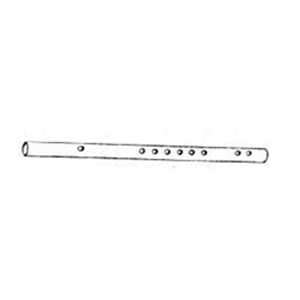Naiyi overview

Naiyi (pinyin: nǎi yī), also known as wooden flute and horizontal flute, is a fringe air-sounding instrument of Uyghur, Uzbek, Tajik and other ethnic groups, popular in Xinjiang Uygur Autonomous Region.
In the frescoes of the Kizil Grottoes in Baicheng, Xinjiang (excavated in the 2nd century AD), there are already images of playing Naiyi.
It varies according to specifications and sizes, usually made of locally grown apple wood, apricot wood, and jujube wood. The wooden stick is hollowed out into a tubular shape. The length of the tube varies from 40 cm to 50 cm, and the diameter of the tube is about 2.5 cm. One blow hole, no membrane hole, six sound holes in the middle, and two sound holes at the right end of the tube. In a section of the flute cavity from the left end of the pipe body to the blowing hole, there is a flute plug about 0.5 from the blowing hole.
Naiyi's playing luck is heavier, the tone is tight, and the volume contrast is strong, which can better show the style of Uyghur, Uzbek and Tajik music.
- type:edge air musical instrument
- nickname:wooden flute, flute
- Pinyin:nǎi yī
- popular area:Xinjiang Uygur Autonomous Region
- material:wooden
overview of other similar instruments
- sanyanxiao overview
- Daguangxian overview
- Leiqin overview
- hahao overview
- yandundagu overview
- Han Xiaozheng overview
- Fang Xiang overview
- guanzi overview
- zhuqin (Dao Qin) overview
- zhuiqin overview
- bangzi overview
- three-stringed piano overview
- Gehu overview
- xiao overview
- xiaokonghou overview
- Konghou overview
- Sheng overview
- suona overview
- hulusi overview
- gushao overview
 渝公网安备 50010702504639号
渝公网安备 50010702504639号